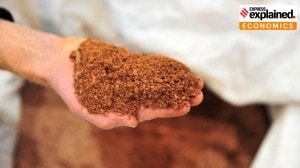France waits for India to get over CTBT hill
NEW DELHI, SEPT 16: As Prime Minister Atal Behari Vajpayee prepares to visit France, India's continuing ambivalence towards the CTBT is a...

NEW DELHI, SEPT 16: As Prime Minister Atal Behari Vajpayee prepares to visit France, India’s continuing ambivalence towards the CTBT is a major stumbling block in building a special relationship with Paris. Vajpayee is travelling early next week to the United Nations where he is expected to make a definitive speech on India’s nuclear policy. On the way back, he will stop for a day in Paris, his first visit to a P-5 country, and an acknowledgment of the supportive role played by France, post-Pokharan II.
The nature of India’s attitude towards the CTBT that the Prime Minister will unveil in New York could turn out to be critical in shaping the future of the Indo-French dialogue. Observers here note that without a positive movement in India’s CTBT position, there might be no real breakthrough in New Delhi’s efforts to open up advanced technological cooperation with Paris, particularly in the area of civilian nuclear cooperation.
In the immediate reactions to the Indian nuclear tests, the French stood apartfrom the rest of the Western world — with a relatively moderate reaction — which condemned India for gatecrashing into the nuclear club.
Not surprisingly, Paris was among the early destinations for the Prime Minister’s Principal Secretary Brajesh Mishra. This was soon followed up by a round of expert-level talks where France urged India to accede to the CTBT. India argued that relaxing controls on the transfer of technologies, particularly opening the door for cooperation in the civilian nuclear sector, would make it easier for India to join the treaty.
France may even be ready to accept India’s nuclear status, going by today’s statement by former French prime minister Laurent Fabius, now on a visit to India. “We recognise facts. We know the advances made by your country in the nuclear field. India is a nuclear power. There is no mystery about it,” Fabius told journalists here.
But for all its understanding of India’s compulsions, France may not be in a position to break ranks with the P-5 over theissue of how to deal with India after the nuclear tests. Given the French commitments to the guidelines of the Nuclear Suppliers Group (NSG), that includes all major industrial nations, it cannot unilaterally export nuclear reactors to India without a change in the rules of the NSG.
Prior to the May tests, relations between India and France were on the upswing. President Jacques Chirac visited New Delhi in January and declared India as a key element in his strategy of promoting a multipolar world.
During Chirac’s visit, the two sides identified energy cooperation as the most important growth sector in bilateral cooperation. The tentative exploration of the possibilities of civilian nuclear cooperation begun almost a year ago were given an impetus. The hope was that India’s enormous need for clean energy could be matched with France’s quest for markets for its saturated nuclear industry.
But there was one catch. India’s position as a permanent dissident in the global nuclear order. The French hinted thatif India were to show greater flexibility in its approach to international non-proliferation regimes, it would be easier for Paris to push for a change in the NSG guidelines and open the door for civilian nuclear cooperation with India.
India’s expectations that France would provide the first breakthrough in its post-Pokharan diplomacy with the great powers, have not materialised. The focus is now entirely on the Indo-US nuclear dialogue being conducted by Prime Minister’s Special Envoy Jaswant Singh and U S Deputy Secretary of State, Strobe Talbott. A breakthrough in the Singh-Talbott talks may provide a critical impetus for taking Indo-French relations forward.
If Vajpayee arrives in Paris with an Indo-US understanding under his belt, his talks with Chirac could acquire a new significance. Otherwise it could end up as yet another routine meeting.





- 01
- 02
- 03
- 04
- 05


























